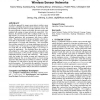1398 search results - page 20 / 280 » Energy Conservation in Reliable Wireless Sensor Networks |
126
click to vote
SENSYS
2003
ACM
15 years 7 months ago
2003
ACM
An effective approach for energy conservation in wireless sensor networks is scheduling sleep intervals for extraneous nodes, while the remaining nodes stay active to provide cont...
126
click to vote
ITCC
2005
IEEE
15 years 7 months ago
2005
IEEE
has to be relayed to nodes interested in those events. Moreover, nodes may also generate queries to find events they are interested in. Thus there is a need to route the informatio...
136
click to vote
IPPS
2005
IEEE
15 years 7 months ago
2005
IEEE
— We consider a dense wireless sensor network where the radio transceivers of the sensor nodes are heavily duty-cycled in order to conserve energy. The chief purpose of the senso...
115
click to vote
HICSS
2005
IEEE
15 years 7 months ago
2005
IEEE
This paper presents a distributed sleep scheduling protocol that can be used for implementing synchronous interface sleep for energy conservation in wireless Ad Hoc networks. Cent...
115
click to vote
MSWIM
2009
ACM
15 years 8 months ago
2009
ACM
In recent years, the number of sensor network deployments for real-life applications has rapidly increased and it is expected to expand even more in the near future. Actually, for...



